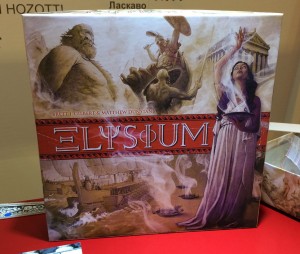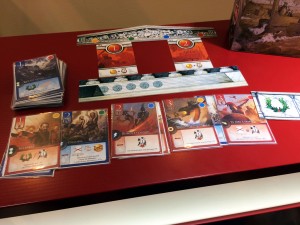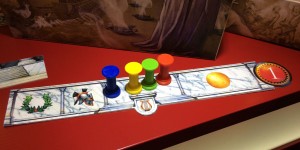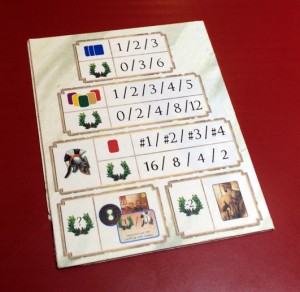Preview: Elysium
Posted by James (admin) on October 16th, 2014
 Elysium is the next game from Space Cowboys – the relatively new publisher who released the excellent (and SdJ nominated) Splendor. Whilst at Spiel, I was fortunate to be given a behind-closed-doors preview of the game.
Elysium is the next game from Space Cowboys – the relatively new publisher who released the excellent (and SdJ nominated) Splendor. Whilst at Spiel, I was fortunate to be given a behind-closed-doors preview of the game.
Note: The photos below do not show the final version of the game but it is quite close. Also, the rules I describe are from memory of what I was told so there may be some inaccuracies, and I am having them checked to make sure. Finally, please excuse the poor lighting in the photos – this was not obvious until I reviewed them.
During Elysium players are all demi-gods, competing to be the best and earn their way into legend. The game is played over 5 rounds and the player with the most victory points (VPs) is the winner.
On the table are several god cards (number of players x 3) as well as turn order markers for the next turn too (one per player). Each round, players take turns taking one of the god cards or turn order markers until they have had 4 turns and all items have been taken.
Each of the god cards gives its owner a benefit or ability – some abilities can be used once during the whole game, some are permanent abilities, some get used once per round, etc. When the cards are gained, they are placed above your player board and these can be used for their abilities, but do not count towards scoring. (To count towards scoring at the end of the game, the cards need to be moved to below your player board and can no longer be used for their abilities – more on that later.)

In this photo, the turn order cards are for a two-player game (1st and 2nd). The colours above the turn order cards show which colour is required to claim it – in this case, either colour above can be used, i.e. 1st could be claimed using yellow or green.
There are 8 sets of god cards in the game – each for a different god. Whilst the cards within each set are different, the abilities of each set of cards have a common theme; for example, one god’s cards are about generating money, etc. Each game is played with 5 of the 8 sets, so this will give variety in replay, especially as 2 of the sets add extra rules too. The cards’ abilities are described by icons, but there is also a small amount of text to assist too which is unobtrusive. As well as the (god) set it belongs to, each god card has the number 1, 2, or 3 on it too which are important when scoring at the end of the game.
At the start of every round, each player starts with 4 coloured tokens (red, blue, green and yellow). On your turn, you can claim any one of the cards or turn order tokens if you currently own the coloured markers that match those shown on the card, i.e. 1 yellow marker, or 1 green plus 1 other colour marker. After claiming the card, you can discard any one of your coloured markers, not necessarily the one that was used to claim it, so you could use your blue marker more than once but at the expense of a different colour being discarded instead.
You have to claim a card with a matching marker if you are able to; however, if you don’t have markers that match any of the cards then you still take an item but you must turn it face-down. Face-down god cards show a god turning its back on you – these cards are usually unhelpful, but a few god cards do interact with these and they can be used to assist scoring at game end too. Face-down turn order cards give you the same turn order number but the money and promotion effects (explained below) are worse.

In the final game, these markers will be wooden (and have symbols to aid players who are colour-blind)
So, the claiming of god cards and turn order each round is a race to grab what you want before others do. However, there’re also a lot of interwoven decisions to be made as you need to work out what cards you’re actually able to take due to the colours you have remaining, what items will combine/score well together, what cards other players are after so might take before you, and so on. You can grab a turn order marker as your first action, but that means many of the god cards may be gone before you get to take your first one, or you can focus on gaining god cards but you may not like the turn order marker(s) you are left with. Many of the god cards give benefits based on other god cards you have too so there is some interaction between them.
At the end of the round, players get the gold and promotions marked on their turn order cards; for example, 1st in turn order gets 5 gold and 2 promotions, whereas 2nd gets 3 gold and 3 promotions (less if they’re face-down). Each promotion lets you move one of your god cards from above your player board to below it (costing gold as well) which means the god card will count towards scoring but the ability of the god card can no longer be used. So, you also need to balance moving cards that give you powers against scoring. Moving god cards to below your player board repreesents them moving to Elysium.
The main scoring happens at the end of the game in several ways. Players get VPs for sets of coloured god cards (a set being 3 cards of the same colour each numbered 1, 2 and 3), for having multiple different coloured god cards, and for the relative number of helmet markers compared to the other players. Players can use the god cards that are face-down (showing the god’s back) to make up sets for scoring but each one used this way costs 2 VPs; however, at least they are a little help.

The victory point summary chart
There seems to be a lot to think about in Elysium. Not only do you need to gain god cards that will work well together but timing is also important. As the round progresses, you will have fewer and fewer coloured markers so your choices will become more limited. Also, there should be some opportunity for denial play as players can take items on purpose so their opponent(s) have nothing left they can claim without turning them face-down.
The timing of when to promote cards (move them into Elysium) should be an interesting decision too. I’m sure you’ll want to keep your abilities but then moving cards so they will score is limited so you can’t wait until too long.
The game looks great and 8 separate artists have created the artwork for each of the sets of god cards, including the artist from Splendor. The art on the god cards does look very impressive.
The game is scheduled for a release in February 2015. I think it sounds like a promising gamer’s eurogame and I look forwards to trying it out.
James.


October 17th, 2014 at 3:59 pm
Splendor didnt win the SdJ thou, Camel Up did…
October 17th, 2014 at 4:10 pm
Well spotted. I’ve amended the post. Thanks for letting me know.
October 23rd, 2014 at 7:09 am
You’ve put up previews for every game I’m interested in from Essen . . . except KanBan. I’m surprised that was the one that didn’t interest you. It’s a heavy game that seems to match up with other games you’ve previewed. Any reason why it doesn’t appeal to you?
October 28th, 2014 at 10:43 pm
You’re right that KanBan probably is the sort of game I would like. Prior to Essen, it seemed quite involved so I kept putting it on the ‘to look at later’ list which meant I didn’t find out much about it, and didn’t have time to read the rules. So, it’s more that it’s not covered rather than it actively didn’t appeal to me because I thought it too heavy or not of interest. Someone I know has a copy of it, so I hope to play that sometime.
Cheers,
James.